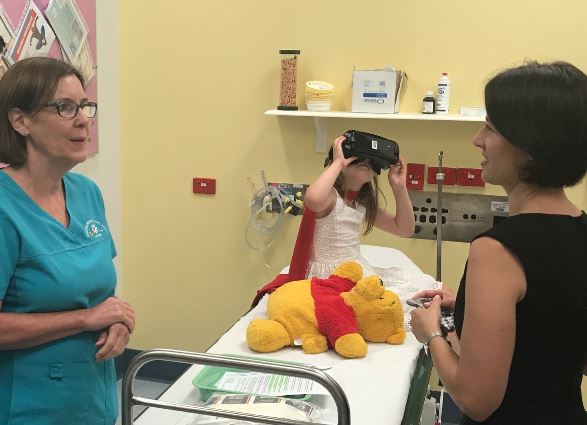
Virtual reality glasses are giving children in hospital good reason to look the other way during minor procedures, while giving valuable insights into the use of such techniques to manage anxiety and pain.
In this project, young children are using Samsung GearVR to explore underwater imaginary worlds while undergoing minor procedures in the Dialysis Medical Day Unit at the Women’s and Children’s Hospital.
The project, supported by Friends of the WCH and Flinders University physiotherapist Associate Professor Belinda Lange, was conceived by a hospital patient Katiah and her mother Rachel Kidwell.
Liaising with the hospital’s Medical Day Unit nursing manager Kathryn Boundy, the project is providing valuable insights into the feasibility of using virtual reality technology in the Dialysis Medical Day Unit and lead to further research in this area.
Current pain management techniques include the application of local anaesthetic cream and distraction (with toys, movies, books or conversation).
Distraction techniques work by focusing attention on an interesting or entertaining activity and diverting attention away from a painful or anxiety provoking event or activity. The more interesting and interactive a distraction technique is, the more attention is focused in the activity.
“A positive experience using virtual reality during one procedure could result in reduced anxiety and distress leading up to future procedures,” says Flinders University researcher Belinda Lange.
“Virtual reality provides a possible distraction technique in which children can be transported into an engaging and interactive game or environment to provide an escape from the real world where the procedure is being performed.”
Medical interventions such as blood draws and catheter insertion can be extremely stressful for children, their family members or carers and staff.
While these procedures are not generally associated with large amounts of pain, the anxiety leading up to, during and following the procedures can be challenging and overwhelming for all involved.
The WCH pilot program was based on Associate Professor Lange’s PhD project back in 2006.
“Now the technology has caught up, and VR equipment become quite accessible,” she says.
See the report from Channel 9 News
Associate Professor Lange, Head of Physiotherapy at the College of Nursing and Health Sciences at Flinders University, is a pioneer of virtual reality and game-based exercise and rehabilitation.
She is currently exploring the opportunities and barriers to the use of technologies in community and residential aged care settings and the use of mobile technologies in the rehabilitation setting.
She serves on the Executive Committee of the International Society for Virtual Rehabilitation and has served on the program committees for international conferences on disability, virtual reality and associated technologies, meaningful play, games for health and smart homes, assistive technologies, robotics and health telematics.

